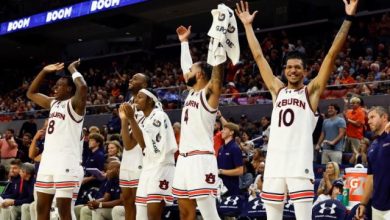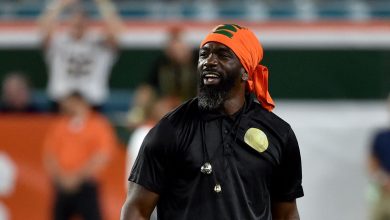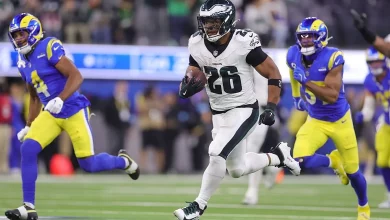Georgia football is in the midst of a rebuilding season.

Georgia Football is in the Midst of a Rebuilding Season: Analyzing the Current Landscape
The University of Georgia Bulldogs football program has long been a powerhouse in college football, with a rich history, passionate fan base, and consistent success at the national level. Under head coach Kirby Smart, Georgia has cemented itself as one of the elite programs in the country, winning back-to-back national championships in 2021 and 2022 and continually competing for top-tier recruits. However, as with any program, the inevitable cycle of talent turnover means that there will be rebuilding seasons, times when the roster undergoes significant changes, and new players must step up to continue the program’s winning tradition.
In 2025, Georgia is facing one of these rebuilding seasons, following the departure of several key players from the national championship teams. This year marks a pivotal moment for Kirby Smart and his coaching staff as they work to replenish the roster, develop new leaders, and set the foundation for continued success in the future. While the rebuilding process can be challenging, it also presents an opportunity for growth and rejuvenation within the program. In this article, we will examine the current state of Georgia football, the players stepping into leadership roles, the key areas of focus for the coaching staff, and the challenges and opportunities ahead as Georgia looks to rebuild and re-establish itself as a championship contender.
1. The Departure of Key Players: Adjusting to a New Era
Every successful program faces roster turnover, and Georgia is no exception. The Bulldogs’ back-to-back national championships in 2021 and 2022 were powered by a remarkable group of players, many of whom were drafted into the NFL. Players like quarterback Stetson Bennett, defensive lineman Jalen Carter, linebacker Nolan Smith, and offensive lineman Broderick Jones were all crucial to Georgia’s success in recent seasons, and their departures left substantial voids in the lineup. With these players no longer on the field, Georgia’s coaching staff faces the challenge of replacing these star athletes, while also ensuring that the next generation of talent is ready to step up.
While it’s never easy to lose a group of players as accomplished as the ones Georgia sent to the NFL, it’s important to note that Georgia has consistently recruited at an elite level. This recruitment success means that the Bulldogs have a steady pipeline of talented athletes ready to take over. However, it’s still a delicate process of integrating new players into the lineup and developing them into contributors capable of keeping the program at a championship level.
2. Quarterback: Transitioning to a New Leader
One of the most significant changes in Georgia’s rebuilding season is at the quarterback position. Stetson Bennett, who led the Bulldogs to back-to-back national titles and earned a reputation as a clutch performer, is no longer in the mix. With Bennett’s departure, the Bulldogs are tasked with finding a new leader under center—someone capable of maintaining the high standards set by Bennett and guiding the offense effectively.
As of 2025, the starting quarterback job has been awarded to Carson Beck, a highly-touted prospect who has waited his turn behind Bennett for several years. Beck, a product of Mandarin High School in Jacksonville, Florida, was ranked as one of the top quarterbacks in the 2020 recruiting class and has shown flashes of brilliance in his limited appearances thus far. Beck is a tall, strong-armed quarterback with excellent mechanics and the ability to make all the throws required at the collegiate level.
While Beck has all the physical tools to succeed, his ability to handle the pressure of being the starting quarterback at Georgia will be a major storyline this season. The quarterback position at Georgia is always under a microscope, and Beck will need to prove that he can handle the pressure, make quick decisions, and manage games effectively. Fortunately for Beck, he’s surrounded by a talented supporting cast and one of the best coaching staffs in the country, which will help ease his transition into the starting role.
Additionally, Beck will benefit from a strong offensive line that will be tasked with providing solid protection and creating lanes for the running game. However, even with these advantages, it’s clear that Beck will need to grow into his leadership role and demonstrate consistency week in and week out.
3. Rebuilding the Defense: Replacing Star Power
One of the cornerstones of Georgia’s recent success has been its dominant defense. The Bulldogs have consistently fielded one of the top defenses in the nation under Kirby Smart, with an emphasis on defensive line play, linebacker play, and secondary coverage. The 2021 and 2022 defenses were arguably two of the best in college football history, with the Bulldogs boasting a ferocious pass rush, an impenetrable run defense, and elite coverage in the secondary.
However, with the departures of several key defensive players, including Jalen Carter, Nolan Smith, and Christopher Smith, Georgia is now in the process of rebuilding its defense. While the Bulldogs have recruited elite talent to replace these players, it will take time for the new faces to gel and establish chemistry.
On the defensive line, players like Mykel Williams, a sophomore defensive end, and Tyrion Ingram-Dawkins, a highly-recruited freshman, are expected to step into significant roles. Williams showed flashes of brilliance in his first season and will be expected to take on an even bigger role as a pass rusher. Ingram-Dawkins, meanwhile, brings a combination of size and athleticism that makes him a dangerous player on the interior of the defensive line.
The linebacker corps, too, will see new faces taking over for the departed Smith and others. Players like Jamon Dumas-Johnson and Smael Mondon, who were key contributors last season, will have to step up as leaders and help maintain the level of play that has become synonymous with Georgia football. Both Dumas-Johnson and Mondon are talented, but they will need to continue developing and refining their skills to keep Georgia’s defense as one of the best in the nation.
In the secondary, safety Malaki Starks is one of the most exciting young players in college football. Starks showed great promise as a true freshman, and he will be a key leader in the back end of the defense. Cornerback will be another area to watch, as the Bulldogs will need to replace some key contributors and develop new players who can match up against elite wide receivers.
While the defense may not be as seasoned as in previous years, the talent is still there. The Bulldogs have the coaching and depth to rebuild the defense and continue being one of the most formidable units in college football.
4. Running Game and Offensive Line: Replacing the Ground Attack
Georgia has long been known for its powerful running game, with running backs like Zamir White, James Cook, and Kenny McIntosh carrying the ball for the Bulldogs in recent seasons. With McIntosh now in the NFL, Georgia must replace key production in the backfield.
At running back, the Bulldogs have a highly talented group, led by Kendall Milton, who has shown flashes of brilliance in limited action. Milton, who is known for his powerful running style, has the potential to be the workhorse for Georgia’s offense in 2025. Behind him, players like Daijun Edwards and freshman Branson Robinson will also be factors in the running game. Robinson, in particular, is a highly touted recruit who could make an immediate impact as a true freshman.
In addition to the running backs, Georgia’s offensive line will play a critical role in re-establishing the dominant rushing attack. The Bulldogs return some key pieces on the offensive line, including Broderick Jones, who was a mainstay on the left side last season and has now moved into a leadership role. The offensive line will need to create consistent push up front to allow Milton and the other running backs to get into space and pick up yards. Georgia’s offensive line, traditionally one of the best in college football, has the talent to get the job done, but it will need to maintain its level of play amidst the roster turnover.
5. Recruiting and Coaching: Building for the Future
While the current season is focused on rebuilding, the long-term health of the program remains a priority for Kirby Smart and his staff. Georgia’s recruitment continues to be one of the best in the nation, and Smart’s ability to reload rather than rebuild is one of the key reasons Georgia remains a top contender year after year. The 2025 recruiting class is already shaping up to be another stellar group, with several blue-chip players committed to coming to Athens.
Additionally, the coaching staff’s experience and ability to develop players will be crucial in navigating this rebuilding season. Smart has built a staff full of talented coaches who have consistently developed players into top-tier college football talent. As the team navigates through a season of transition, the leadership and expertise of the coaching staff will ensure that Georgia remains competitive on a national level, even if the roster is in flux.









